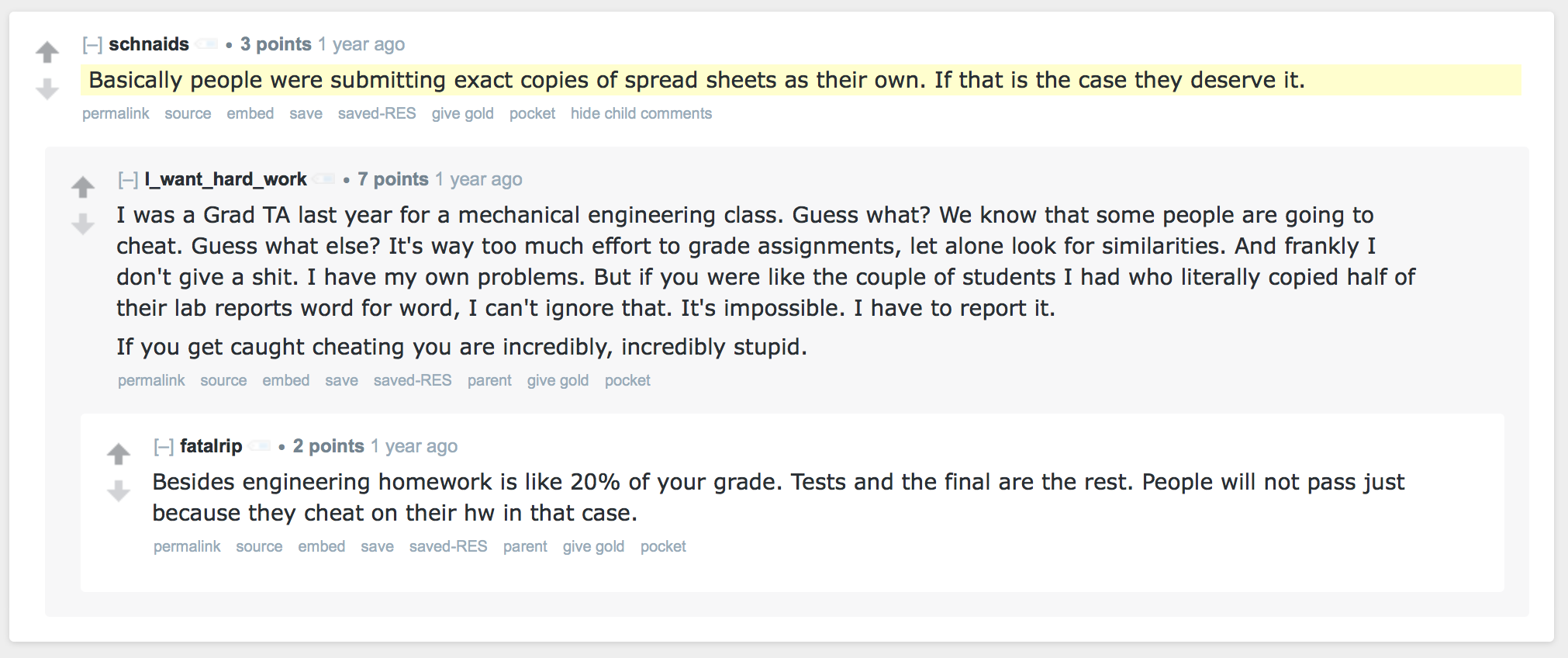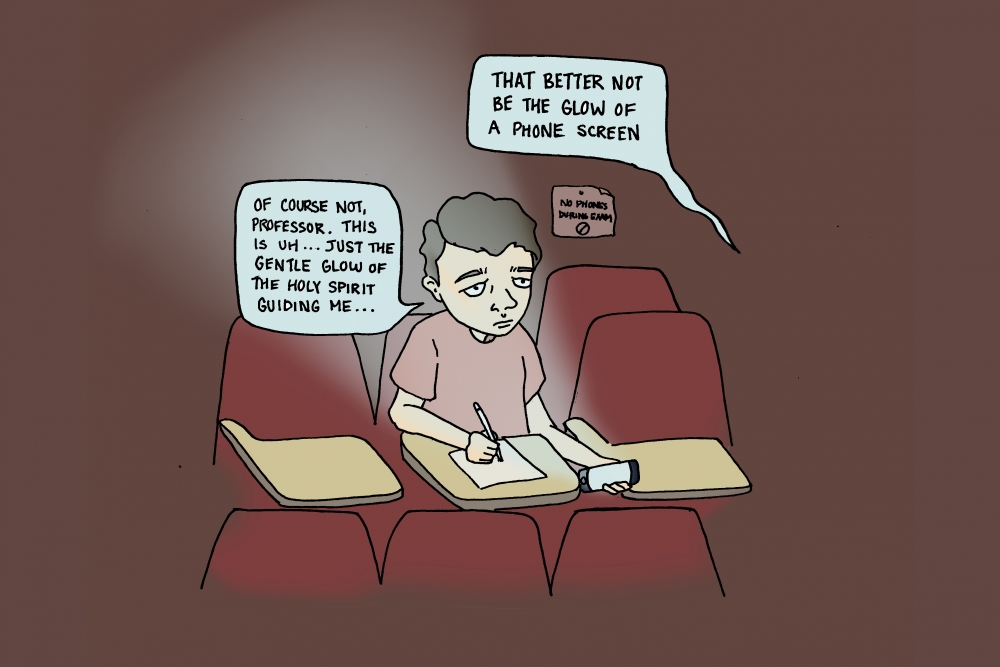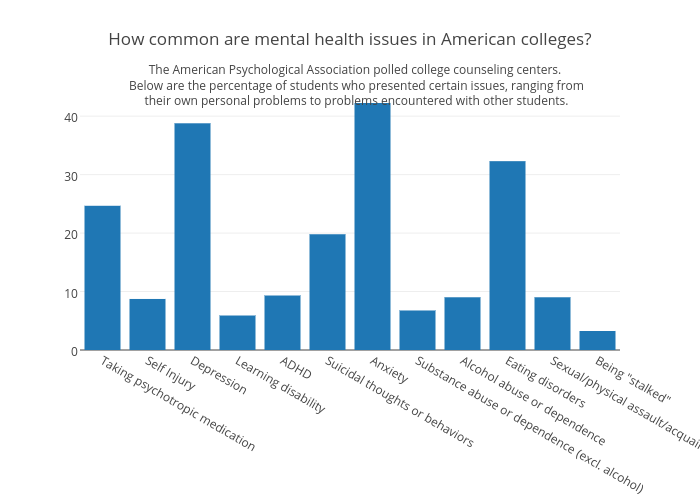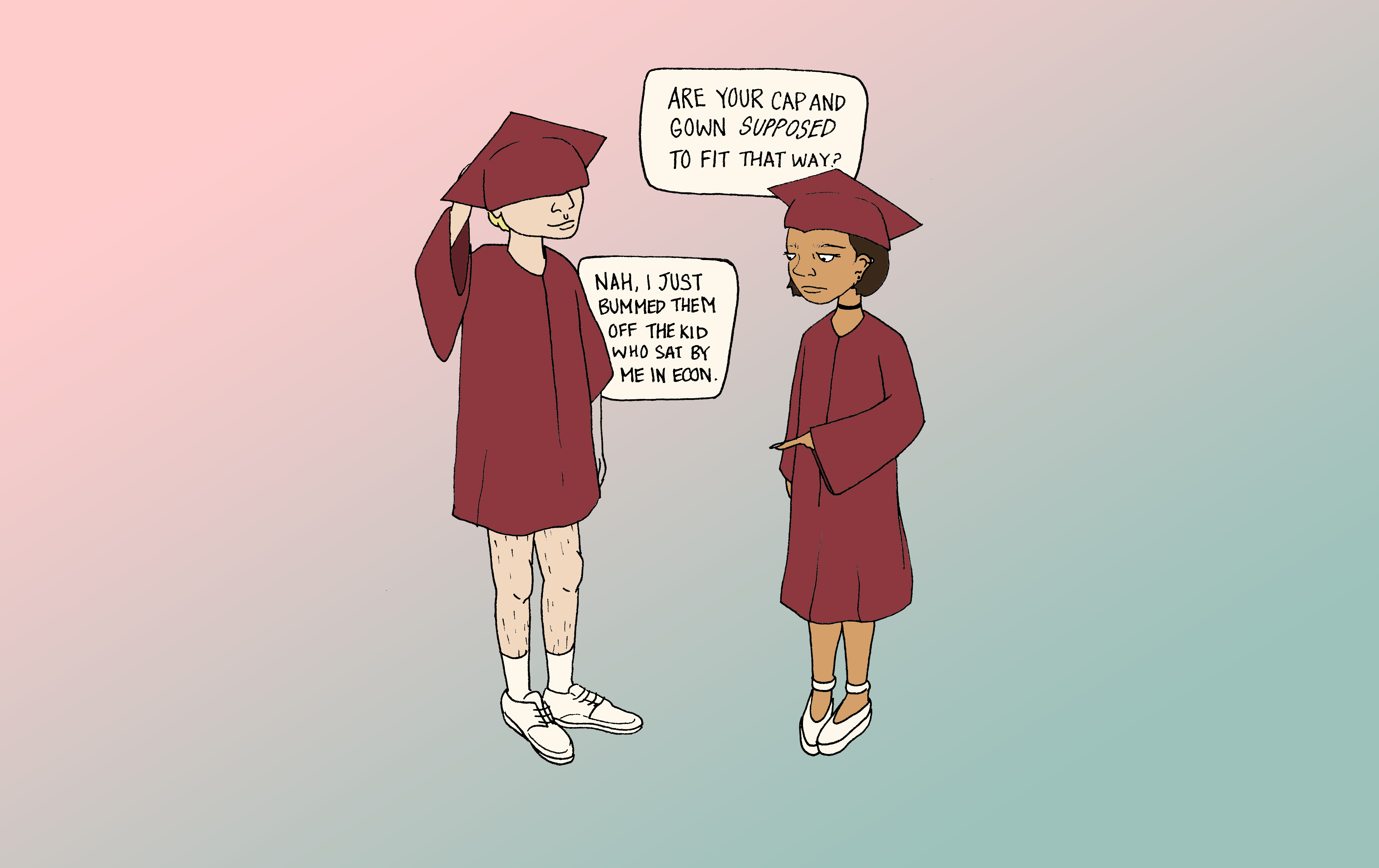It’s a weeknight at ASU, and
As
With her exam scene set up, now she’s ready to tackle her
Cheating is nothing new in college culture; from giving a friend homework answers from the online class you took last semester to getting together with classmates to complete the political science quiz online as a group, students like Lei are resorting to cheating to face what they see as overwhelming demands. While her story may not be an isolated case, reliable metrics to show how many students actually cheat are unavailable.
ASU offers thousands of courses, both online and in person, and various majors from 17 colleges at the University. Developing study groups within programs and majors is nothing new; but when does “helping” each other turn into cheating? And how are ASU students getting away with it?
What is Cheating?
ASU’s academic integrity policy defines cheating and academic dishonesty 14 different ways:
“At Arizona State University, we hold students to a high standard of honesty and integrity — for the benefit of their own academic, personal and professional success and to act in a way that is productive and respectful towards their learning community,” according to a statement from the University.
However, ASU students have their different definitions of cheating.
“Cheating, to me, is a dishonest action, so probably that is an action where you sacrifice your integrity to achieve a certain outcome, being dishonest for the most part,” business and Spanish senior Jasmine Hinton said.
“I guess cheating is anything you use that’s not originally yours, whether that be for papers or for tests if you look over and see an answer,” psychology freshman Ronald Bessling said.
Bessling said cheating isn’t only specific to individual students. He said working in groups can sometimes lead to cheating, too.
“I guess cheating (in groups) would be like if you’re sitting there and not doing anything and saying: ‘Hey, what’s this, this and this?' and just write in the answers without doing any of the work,” Bessling said.
Cheating in ASU colleges
Cheating is a problem across all colleges at ASU, with students looking for ways to stay on track.
Nursing student *Sarah said the ASU College of Nursing and Health Innovation is one of the hardest programs at ASU. With a minimum GPA acceptance rate of a 3.75, challenging classes and limited spots available in the program, the nursing school requires intense work to prepare undergraduates for their careers. With this demanding work-load and high GPA requirement, stress and pressure are normalized at the nursing college.
Sarah said this pressure has resulted in widespread cheating at the school.
“We feel like we have to cheat to get into the program,” she said. “And then you feel like you need to cheat because everyone is cheating around you. And it’s just a circle where you have to step back and think about it: Do any of these nursing students actually know the concepts they need to know to be successful as a nurse?”
Sarah said not everyone who cheats thinks it's okay to do so, rather she feels like there’s a fine line between the pressure to cheat and accepting the fact that if you don't cheat, you might do worse than the rest of your peers. It's a difficult battle.
In a major where the exams are known to be difficult, Sarah said tests generate most of the cheating in her nursing classes.
“The joke in nursing school is that you make so many new friends the hour after you take a test,” she said. “Because you’ll get texts from people you haven’t heard from in weeks, and they’re like: 'I was really nervous about the concepts of the
Sarah recalled a situation for one of her nursing classes when she received an email from a student with the subject “
“Ever since then, I’ve been so livid because I was terrified of that email getting found out, but at the same time I wanted to go to nursing (administration),” Sarah said. “It’s savage.”
The nursing school isn’t the only ASU college that has had experience with widespread cheating. The W.P. Carey School of Business experienced a cheating scandal with a class called CIS105 in fall of 2014 taught by professor Matthew McCarthy.
Multiple students in the business school confirmed the scandal with The State Press. Students gave accounts on Reddit as well, saying a group of around 200 were caught pasting unoriginal work into a homework assignment.
A student who was in the class, Katie, said she remembered McCarthy warning students not to cheat, but they still did it anyway.
She said when she took the class two years ago, the students were asked to do an Excel assignment and upload it to a website, which they were warned would detect if the information had been copy and pasted.
"Well apparently people didn't listen, because in class he told us over 200 people got caught and that he'd be emailing them within the next couple of days to let them know they'd be receiving an XE for the class and possibly kicked out of W.P. Carey," she said.
ASU uses XE grades as a specific indication of academic dishonesty on a student's transcript.
Katie said she wasn't sure if the students were actually kicked out of the school because the cheating scandal wasn't brought up for the rest of the semester.
McCarthy said he was unable to discuss the matter in detail.
"Cheating in my class has gone down to practically a trickle because we do a great job of finding it and a great job of prosecuting it," McCarthy said.
The W.P. Carey school was also unable to confirm cheating in the specific business class due to student privacy.
“While I know you are interested in details regarding past academic integrity issues with our students, I am unable to comment on them,” W.P. Carey Associate Dean Michele Pfund wrote in an email. “We believe in protecting the privacy of all of our students – whether they are stellar academic students, or students who may have had an academic integrity issue.”
The "easy" way out
In the age of the internet, information is more accessible than ever. Instead of having tangible books in classes, some professors opt to have students use e-books or upload readings to B
ASU has an abundance of strictly online classes where assignments,
Lei said cheating on her online assignments is simple. She has been able to find multiple ways to get her assignments done fast and get a good grade on them.
“For example, if a discussion board post isn't a 'post-first,' all you have to do is read three to four well-worded posts, paraphrase them, and post,”
Lei said online resources, such as
Quizlet are a big help to students looking for answers to assignments. Quizlet is a resource used to help students study for exams or quizzes by allowing users to make their own quizzes,
Many professors have attempted to put in “blocks” to stop students from even exiting the assignment they’re completing online by using lockdown browsers, which are used to stop students from looking up answers online while taking a quiz or test. But
“I would just grab another laptop and look up the answers that way, sometimes going as far as watching entire lectures
Psychology senior lecturer Eva Szeli Ph.D said she remembered a time she used lockdown browsers in one of her courses, and she still caught students cheating, even with a camera on them.
"Initially, I was noticing things like the glow from the side of an iPad, and the student had glasses on, and I could see the iPad in their glasses," Szeli said. "But the reality is that in most cases it doesn't take that level of sophistication because their attempts aren't that sophisticated, which is mind-blowing considering the level of deterrence we're using."
Going to college in the digital age has arguably made things more accessible to students. Things like business transactions can be done with a click of a mouse, rather than meeting face-to-face. Convenience is
Studybay.com, a self-described “online academic exchange,” provides writing services for term papers, dissertations, essays and more. Students are able to “order” assignments; then writers offer their services through a bidding format. S
The student will then receive their assignment and rate the writer on their quality of work.
What leads students to cheat?
Lei said the schedules that exist outside of a student’s academic life are what can lead students to cheat and take the “more convenient” path for classes. Looking back on the past four years,
“In today's world where students are working two to three jobs and sleeping four to six hours a night in order to pay the bills as well as go to school full-time, this is the reality for many people,”
Genetics senior Brett Johnson said he has never cheated while being an undergraduate at
“The class can be very simple, but a lot of work,” Johnson said. “It’s a simpler investment in
Johnson said he believed cheating among students is a student’s choice, but he also believes the University can be at fault to some degree. He said he doesn't feel like general education classes are a complete waste of time, but he thinks the University has a responsibility to explain to students why certain classes are necessary to obtain a degree.
“I think the onus is on the University to explain the utility of these classes,” Johnson said. “It’s on the University to tell us why it matters.”
President Michael Crow said in a meeting with State Press that he feels the University does it all it can by providing instruction when students cheat and reprimanding them accordingly.
"You know cheating is bad from childhood, from before you go to kindergarten," he said. "There's not more that we can necessarily say that says 'please don't cheat. Do we do enough to project an ethos of not cheating? Yeah, I don't know, but cheating in relationships, cheating on tests — cheating is bad. ... I think it sort of goes without saying."
Students have various opinions on why they themselves or their peers cheat, but what about the psychology behind cheating?
Szeli said there are types of cheaters situational or opportunistic cheaters, who have external motivations that push them to be academically dishonest. The other group of cheaters are dispositional, who are motivated by internal factors.
“Something was happening to them from the outside and that they felt this desperation and you hear that desperation in a lot of students,”
Szeli said she has repeatedly stressed the importance of academic integrity in all her classes, not only putting the policy on the
“Our job with both (types of cheaters) is to reduce the external motivations and the opportunities and make it as hard as possible,”
ASU Accountancy Lecturer Eric Rosano talks cheating from The State Press on Vimeo.
But
“That’s another thing that the research
Szeli said she is active with catching, investigating and penalizing any cheating she comes across in her courses.
Psychology senior lecturer Carolyn
“It varies,” Cavanaugh-Toft wrote in an email. “Students who are more dispositional cheaters tend to feel less guilty; in fact they appear to be more upset that they were caught. On the other hand, when confronted, situational cheaters will be more likely to talk about the stresses and external pressures they were experiencing, and they will report feeling guilty."
In an environment loaded with the pressure for good grades and performance, anxiety and stress are common mental health challenges that interfere with college students.
"Students experiencing mental health difficulties like anxiety and depression may feel overwhelmed by academic demands, which may — in certain situations — make them vulnerable to temptations to cheat," Cavanaugh wrote. "It's important for faculty to emphasize that cheating is not an acceptable alternative to reaching out for guidance or help, and we need to make sure that students who are facing mental health challenges have places to turn for support, so that they don't make desperate academic decisions that can make them feel even worse, as well as jeopardize their academic and professional careers."
A 2013 survey from the Association for University and College Counseling Center Directors said the number of students who suffered from severe psychological problems has increased in the past year.
The impact of cheating
From a University standpoint, the course of disciplinary action is arguably a long and complicated one and varies depending
Generally, a complaint is made about the student who is accused of cheating. The complaint then receives a response from the instructor, who will determine whether to give the accused a sanction of a reduced grade for an assignment or a reduced grade for the course.
If the instructor desires to recommend a sanction further, including an XE grade, the recommendation must be forwarded to the college’s dean, director or designee for approval. Students are allowed to offer resolutions during the
ASU Career Services Director Brandee
“That (cheating) could have a negative impact on who might be able to serve as a reference to them,”
ASU English Professor Soren Hammerschmidt talks cheating from The State Press on Vimeo.
If students manage to spend their entire undergraduate career without being caught cheating,
”That could potentially come to light and have a negative impact on their position, ”
Sarah said the cheating going on around her in nursing school hasn't deterred her from her studies, and she tends to focus on the work she does rather than how others do their work.
"I just try and stay away from it," Sarah said. "It was a lot harder to deal with when we were all applying to the program and I was worried I would lose my spot to someone who cheated and had better grades than me, but now that I'm in it I don't worry about it as much."
For Lei, academic dishonesty in college has showed her a lot more than people cheating to get a grade — it shows her the pressures the academic system places on students, and the lengths some go to deal with those demands.
"It shows the ugly reality that our educational system is completely broken," Lei said. "Learning should be about growing our knowledge of the world and applying it, not cramming for a test to get a letter grade, and then forgetting everything we've just learned."
Resources for ASU students
According to the ASU Provost Office’s website, the school recommends a variety of options, encouraging students to familiarize themselves with ASU’s academic integrity policy, asking professors and advisors for help and utilizing ASU’s tutoring services on all four campuses.
University Academic Success Programs director Ivette Chavez said the number of visits at ASU’s tutoring centers on the Tempe campus
Chavez said workers in the tutoring centers are trained to detect academic dishonesty and trained to help students avoid cheating. She said students should put more effort into using resources like the tutoring centers to avoid the desire to cheat.
“If (students) use the same amount of energy in their classwork, I’m certain they will do well,” Chavez said.
Even ASU counseling services assist with students who are having trouble academically. Vice President of
ASU Counseling Aaron
“I would help the student understand what led up to the cheating — what they were thinking, feeling and doing,”
ASU president Michael Crow said that the University takes measures to counteract cheating because it limits the student's learning process, but ultimately academic integrity is the responsibility of the student, who should have an innate knowledge that cheating is wrong.
ASU President Michael Crow talks cheating from The State Press on Vimeo.
"The interesting thing about cheating is that it only punishes the cheater," Crow said. "At the end of the day, it can hurt other people also, but it basically hurts the cheater."
*Some names in the story have been altered to protect the identity of the source.
Note: Additional information was added to this article on Oct., 20, 2016.
Reach the investigative reporter at sgreene6@asu.edu or follow @thesydneygreene on Twitter.
Like The State Press on Facebook and follow @statepress on Twitter.









